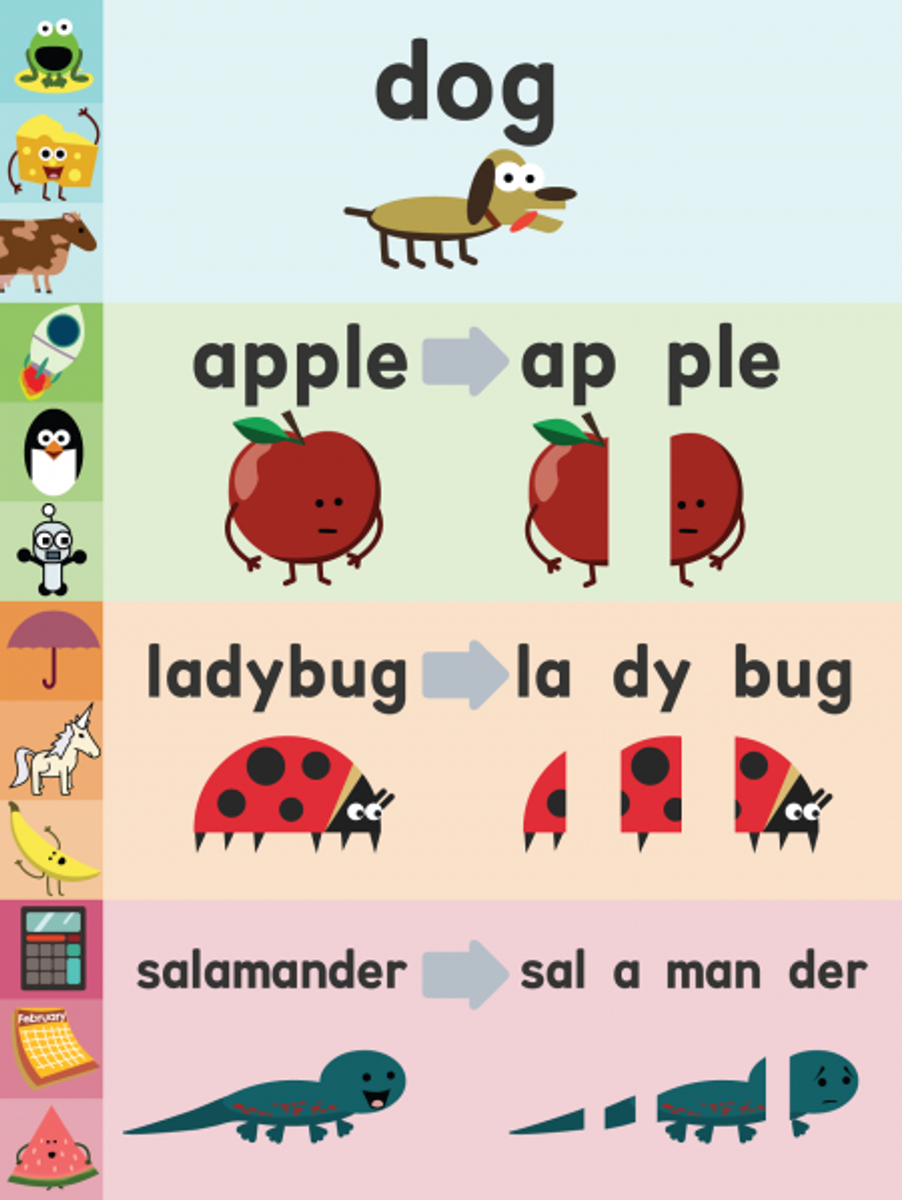Learning and Teaching

The Science of Reading
Just a recap ......
Thus far in this series of the newsletter, we have covered :
- graphemes
- phonemes
- short and long vowels, and
- digraphs.
Another key element of the Science of Reading is known as Phonemic Awareness, which is the ability to recognize and manipulate the spoken parts of words. Over the next few newsletters, we will delve into the key skills that require explicit instruction when teaching and learning phonemic awareness.
Syllables
A syllable is a single, vowel-centered unit of a spoken (or written) word. Students are taught that words contain parts called syllables, that each of those syllables contains a vowel sound, and that syllables can be counted or blended. Understanding syllables helps students decode text faster and more fluently, as well as develop correct pronunciation of words.
Apart from looking at the word for the vowel sound - another strategy that teachers use (that you may like to reinforce at home) is to get your child to place their hand underneath their chin and say a word out loud. Each time their chin pushes down onto their hand - they count one syllable.
Fun fact:
Pneumonoultramicroscopicsilicovolcanoconiosis is the longest word in the English dictionary and has 19 syllables!
Helping Your Child with Maths: A Guide for Parents
Mathematics can be a fun and rewarding subject, but it’s common for children to need a little extra support outside the classroom. As parents, you play a crucial role in your child's mathematical development. Here are some practical and engaging ways you can help your primary school-age children with maths at home.
1. Make Maths a Part of Everyday Life
Integrating maths into daily activities makes learning more meaningful and less intimidating for children. Here are some ideas:
- Cooking Together: Cooking involves measuring ingredients, doubling recipes, and dividing portions, all of which provide practical applications of fractions and multiplication.
- Shopping Trips: Take your child grocery shopping and involve them in budgeting, comparing prices, and calculating discounts.
- Telling Time: Use both digital and analogue clocks to help your child learn to tell time and understand the concept of elapsed time.
2. Play Maths Games
Games are a great way to make maths fun. Here are some activities to try:
- Board Games: Many board games involve counting, strategy, and probability. Games like Monopoly, Chutes and Ladders, and even card games can reinforce maths skills.
- Online Maths Games: There are many educational websites and apps with interactive maths games. These can provide engaging practice in a variety of maths topics.
3. Use Positive Reinforcement
Building confidence is key to helping children succeed in maths. Praise your child’s efforts and progress, not just their achievements. Create a positive environment where mistakes are viewed as learning opportunities.
4. Encourage a Growth Mindset
Teach your child that abilities in maths can be developed through hard work and perseverance. Emphasise that everyone can improve their maths skills with practice and dedication.
5. Work on Problem-Solving Skills
Encourage your child to approach problems methodically:
- Understand the Problem: Discuss what the problem is asking.
- Plan the Solution: Think about the steps needed to solve the problem.
- Solve the Problem: Work through the steps.
- Check the Work: Review the solution to ensure it makes sense.
6. Create a Homework Routine
Set aside a regular time and place for homework to help your child develop good study habits. Ensure this space is quiet and free from distractions. Be available to help, but encourage your child to try solving problems on their own first.
7. Utilise Resources
There are numerous resources available to support your child’s learning:
- Books and Workbooks: Look for age-appropriate maths books and workbooks to provide extra practice.
- Educational Websites: Websites like Khan Academy, BBC Bitesize, and CoolMath4Kids offer tutorials and exercises.
8. Discuss Maths Positively
Your attitude towards maths can influence your child’s perception. Even if you struggled with maths yourself, try to speak about it positively and show enthusiasm for their learning.
9. Engage in Mathematical Conversations
Talk about numbers and maths concepts in everyday conversation. Ask questions that prompt your child to think mathematically, such as:
- “How many slices of pizza do we need if everyone wants two slices?”
- “What shape is this object, and how many sides does it have?”
10. Be Patient and Supportive
Learning maths is a process that takes time and practice. Be patient and provide consistent support. Celebrate small successes to keep your child motivated and confident.
By incorporating these strategies, you can help foster a love of maths in your child and support their academic journey. Together, we can make maths a subject that every child finds accessible and enjoyable.
Nicola Toney (Mathematics Leader F - 6)

